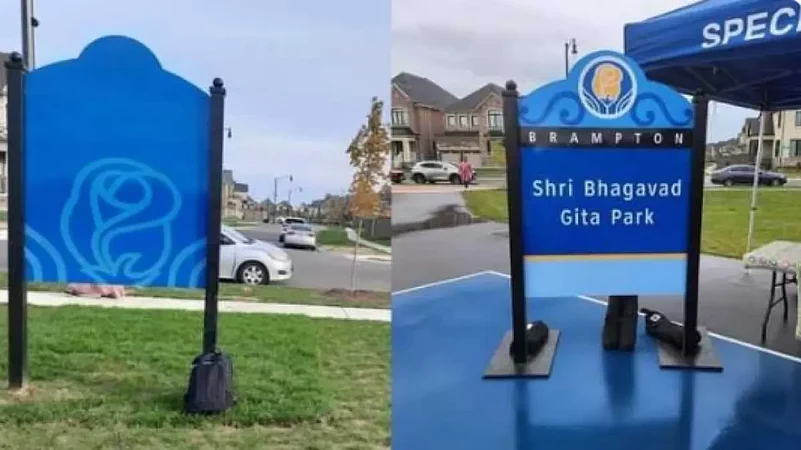Adding to the India-Canada tension over advisories and counter advisories on alleged hate crimes, the High Commission of India in Canada on Sunday condemned the vandalism at a recently unveiled park named 'Shri Bhagavad Gita' in Brampton and urged the authorities to investigate and take prompt action against the perpetrators of the hate crime.
The park earlier known as Troyers Park was renamed as Shri Bhagavad Gita Park and was unveiled on September 28.
However, in a mid-night tweet the Brown said that nothing is to worry as their investigation found “the reported blank sign as installed by the builder as a placeholder until he permanent Shri Bhagavat Gita Park sign can be replaced tomorrow.” He also added that “We are thank the community or bringing this to our attention, and ensuring Brampton is a safe and inclusive place to call home.”
Advertisement
Earlier, official Twitter Account Indian High Commission, Otawa, Canada tweeted, “We condemn the hate crime at the Shri Bhagvad Gita Park in Brampton. We urge Canadian authorities & @PeelPolice to investigate and take prompt action on the perpetrators.”
In response the Mayor of Brampton Patrick Brown clearly said that there would be zero tolerance for such violence. Condemning the action, Brown tweeted, “We are aware that the recently unveiled Shri Bhagavad Gita Park sign has been vandalized. We have zero tolerance for this. We have flagged Peel Regional Police for further investigation. Our Parks department is working to resolve and correct the sign as soon as possible.”
Advertisement
Interestingly, it was only in September 28, after the renaming of the park, Brown celebrated the Mosaic nature of the city and said, “Today, the @CityBrampton unveiled the renaming of Brampton's Troyers Park to Shri Bhagavad Gita Park. Brampton is a Mosaic, and this renaming commemorates the Hindu community and all they contribute to our City. We celebrate all cultures and all faiths in our City.”
Attacks on Temple and Caution issued by MEA
The attack in Brampton came just fortnight after the attack on renowned Hindu temple BAPS Swaminarayan Mandir. On September 15, the Mandir was allegedly defaced by ‘Canadian Khalistani Extremists’ with anti-India graffiti.
The Indian High Commission strongly took note of the incident and tweeted, "We strongly condemn defacing of BAPS Swaminarayan Mandir Toronto with anti-India graffiti. Have requested Canadian authorities to investigate the incident and take prompt action on perpetrators.
This attack along with the Khalistani referendum held at Brampton on September 19 by Sikh For Justice (SFJ), a separatist group banned in India triggered the Ministry of External Affairs to issue a caution statement saying that there is a “sharp increase in hate crimes, sectarian violence and anti-India activities.”
“The perpetrators of these crimes have not been brought to justice so far in Canada,” the statement added.
Advertisement
Canada’s Response to the Earlier Attack
Following the caution statement of MEA, a strange travel advisory came from Canadian Government that asked its citizens not to travel across the states in the India-Pakistan border. Warning its citizens of landmines and unpredictable security situation, the website of Canada Government last updated on September 27 said, “Avoid all travel to areas within 10 km of the border with Pakistan in the following states due to the unpredictable security situation and presence of landmines and unexploded ordnance: Gujarat, Punjab Rajasthan.”
The advisory also asked their people to not visit North-Eastern states and warned them of threats of terrorist attacks across the country.
Advertisement
Deep-rooted Conflict
While the political observers consider this as a response of Canada to India’s hate crime jibe, the root of the conflict between Modi-led Indian government and Justin Trudeau-led Canadian Government is far deep.
During the last year farmers’ protests in India, that literally rocked the boats of Narendra Modi Government leading to the withdrawal of three controversial farm laws, Justin Trudeau threw his hats into the rings. While addressing Sikhs of Canada, who constitute a formidable voting population in the country on Guru Nanak’s birthday, Trudeau said, “I would be remiss if I didn’t start by recognising the news coming from India about protests by farmers. The situation is concerning. We are all very worried about family and friends. We know that’s a reality for many of you. Let me remind you, Canada will always be there to defend the rights of peaceful protesters. We believe in the process of dialogue. We’ve reached out through multiple means to the Indian authorities to highlight our concerns. This is a moment for all of us to pull together.”
Advertisement
India didn’t receive the statement in a good manner and the already stressed-relation further got complicated. In this context, the political observers think that India should believe in the explanation given by Brampton Mayor and must try to redevelop the strained bilateral ties with continuous engagements in different levels.
(With Agency Inputs)




















